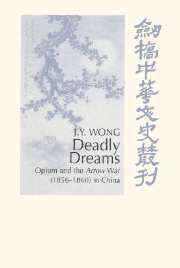Book contents
- Frontmatter
- Contents
- List of Tables
- List of Figures
- Poem by the late Mr Qin Esheng
- Foreword by Professor Wang Gungwu
- Foreword by Professor C. A. Bayly
- Preface
- Part I The confusion of imperialism
- Part II The pretext for imperialism
- Part III The personalities of imperialism
- Part IV The rhetoric of imperialism
- 7 Marx, Punch, and a political press: The debate among the British newspapers
- 8 The Arrow incident and international law: The debate in the House of Lords
- 9 Triumph of the liberal conscience: The debate in the House of Commons
- 10 ‘Johnny’ is on his knees: The ‘Chinese Election’
- Part V The mechanics of imperialism
- Part VI The economics of imperialism
- Part VII The dynamics of imperialism
- Chronology of major events
- Word list
- Abbreviations
- Bibliography
- Index
7 - Marx, Punch, and a political press: The debate among the British newspapers
Published online by Cambridge University Press: 29 September 2009
- Frontmatter
- Contents
- List of Tables
- List of Figures
- Poem by the late Mr Qin Esheng
- Foreword by Professor Wang Gungwu
- Foreword by Professor C. A. Bayly
- Preface
- Part I The confusion of imperialism
- Part II The pretext for imperialism
- Part III The personalities of imperialism
- Part IV The rhetoric of imperialism
- 7 Marx, Punch, and a political press: The debate among the British newspapers
- 8 The Arrow incident and international law: The debate in the House of Lords
- 9 Triumph of the liberal conscience: The debate in the House of Commons
- 10 ‘Johnny’ is on his knees: The ‘Chinese Election’
- Part V The mechanics of imperialism
- Part VI The economics of imperialism
- Part VII The dynamics of imperialism
- Chronology of major events
- Word list
- Abbreviations
- Bibliography
- Index
Summary
I. Peace or war: The Times
The general public in Britain first heard about the Arrow quarrel on Monday 29 December 1856 through a telegraphic despatch from Trieste. On New Year's Day, the overland mail arrived. At once The Times published a second edition and printed a summary of a report from their correspondent in Hong Kong. The next day, The Times reproduced the entire report detailing events up to 15 November 1856. On 6 January 1857, the British government published in the London Gazette Admiral Sir Michael Seymour's despatch to the Admiralty, with enclosures, about the operations of the Royal Navy in the Canton River, the destruction of Chinese forts, and the bombardment of Canton.
How did the British press react to the news of this undeclared war? The Times editorial of 2 January 1857, that is, the same day on which The Times printed in full the report from its own correspondent in the Far East, is noteworthy. The editor warned the nation that to tolerate Yeh's behaviour would be entirely to forfeit the position already acquired by the Opium War (1839–42) and to present Britons to the Chinese as a nation devoid of honour and self-respect. It argued that Yeh's refusal to receive Her Majesty's representative was in itself the termination of friendly relations and an advertisement that the Treaty of Nanking, as far as Canton was concerned, was virtually at an end.
- Type
- Chapter
- Information
- Deadly DreamsOpium and the Arrow War (1856–1860) in China, pp. 153 - 173Publisher: Cambridge University PressPrint publication year: 1998



